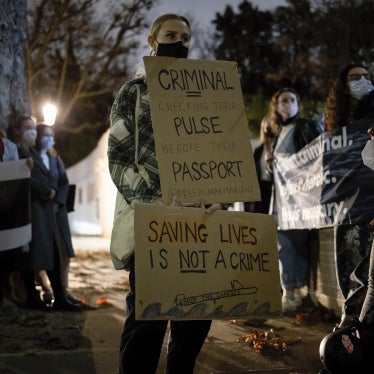(Brussels) – European leaders should use a high-level gathering with “Eastern partners” to insist that the Azerbaijan government unconditionally release anyone held on politically motivated charges, Human Rights Watch said today. Azerbaijan has detained dozens of journalists, human rights defenders, and other critics of the government.
Top European Union officials and leaders of the 28 EU member states are meeting in Riga, Latvia, on May 21 and 22, 2015, with senior leaders from several neighboring countries, including Foreign Minister Elmar Mammadyarov of Azerbaijan, at the EU’s Eastern Partnership Summit. The Riga summit is the last high-level meeting between the EU and Azerbaijan before Baku hosts the first European Games from June 12 to 28.
“This high-level meeting presents a key opportunity for the EU to make good on its pledges to human rights activists, and unanimously insist that Azerbaijan stop the crackdown and free jailed critics,” said Lotte Leicht, EU director at Human Rights Watch. “The EU should make clear that deeper engagement with Azerbaijan is out of the question until the government rectifies its abysmal rights record.”
The EU describes the summit as an opportunity to “discuss ways of strengthening bilateral, multilateral and sectorial cooperation.” The other Eastern Partnership countries are Armenia, Belarus, Georgia, Republic of Moldova, and Ukraine.
In a letter to EU foreign ministers and the EU leadership on April 30, Human Rights Watch urged a strong collective response to the Azerbaijani government’s crackdown and concrete implications for the country’s relations with the EU. The EU should halt its negotiations with Azerbaijan toward a “Strategic Partnership Agreement” until the government releases wrongfully detained activists and dramatically improves conditions for human rights defenders and independent activists and groups, Human Rights Watch said.
EU leaders should not attend the opening ceremonies of the European Games unless Azerbaijan ends its crackdown and frees people held on politically motivated grounds, Human Rights Watch said.
The EU has taken strong measures in recent years in response to the Belarusian government’s crackdown on activists, including politically motivated prosecutions of human rights defenders, journalists, and political opposition activists.
The EU has repeatedly pledged to place human rights at the core of its relations with third countries and to stand up for those who defend human rights. When adopting the EU’s Strategic Framework for Human Rights and Democracy in June 2012, EU foreign ministers pledged that the EU will continue “to throw its full weight behind advocates of liberty, democracy and human rights throughout the world.” In June 2014, they promised to “intensify” the EU’s “political and material support to human rights defenders and step up its efforts against all form of reprisals.”
In a strongly worded resolution adopted in September 2014, the European Parliament stressed that the EU’s closer ties with Azerbaijan should be conditioned on the release of imprisoned human rights defenders and called for an “end to repression and intimidation of NGOs.” The European Parliament president, Martin Schulz, should clearly convey this position during the Riga summit, Human Rights Watch said.
Other senior EU officials expected at the summit include European Council President Donald Tusk, European Commission President Jean-Claude Juncker, EU High Representative Federica Mogherini, Neighborhood Policy and Enlargement Negotiations Commissioner Johannes Hahn, and Trade Commissioner Cecilia Malmström.
“The EU has shown that it can muster the political will to protect human rights defenders under threat in the European neighborhood,” Leicht said. “Now EU leaders need to tell Azerbaijan that it has crossed the line of what’s permissible from a respectable partner and that there will be repercussions for bilateral and multilateral relationships unless human rights activists are released.”







